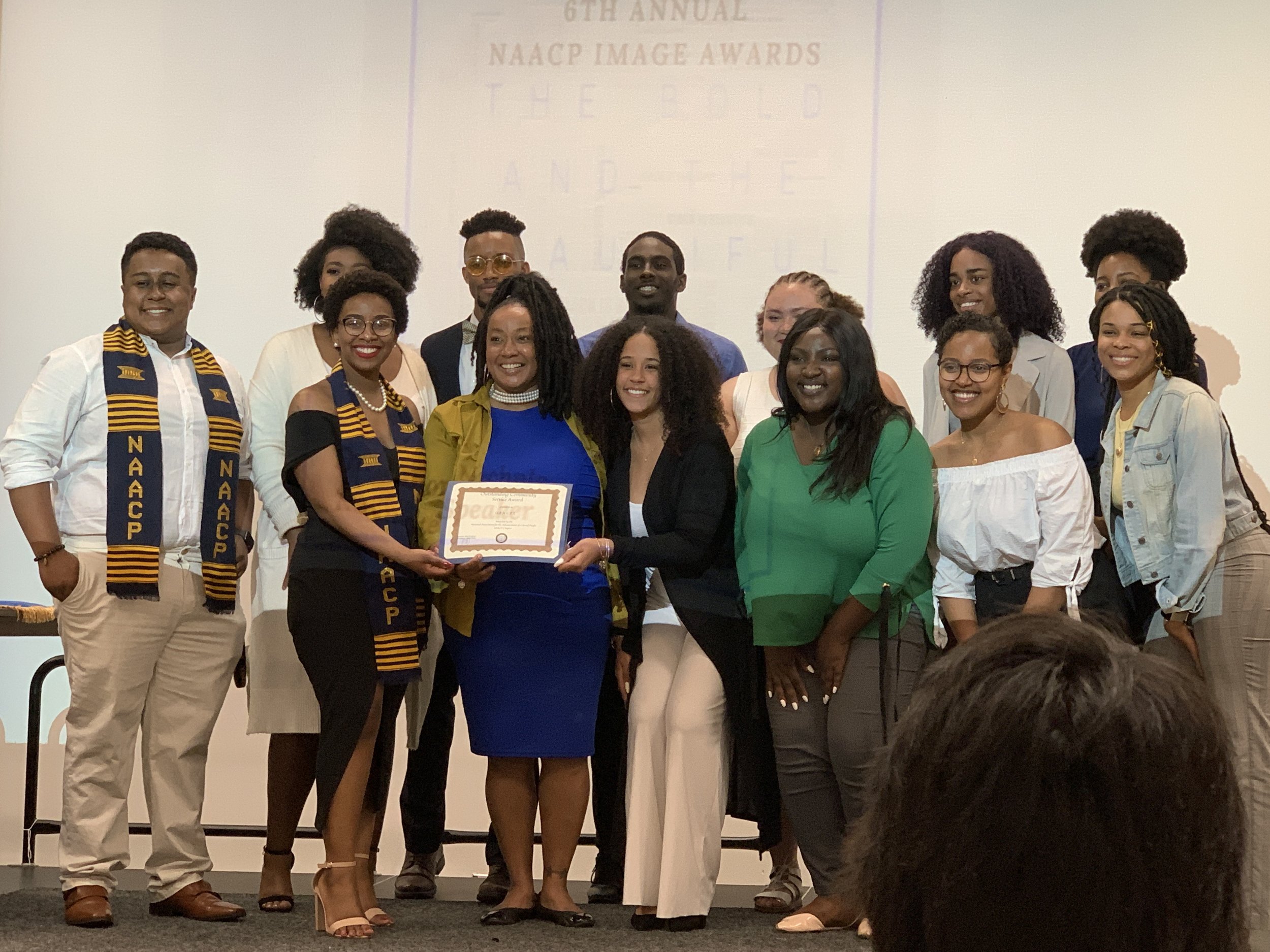NAACP’s awards remind students to love themselves
Members of Unified Engaging eXperience Committed to Empowering Leadership accept the University of Maryland College Park chapter of the National Association for the Advancement for Colored People Image Award for community service on Monday, May 6, 2019. U.E.X.C.E.L. aims to teach students of color the skills they need to become leaders on campus. (Amina Lampkin/The Black Explosion)
The University of Maryland chapter of the National Association for the Advancement of Colored People held its sixth annual Image Awards Monday night in the Nyumburu Cultural Center’s multipurpose room.
Themed “The Bold and the Beautiful,” this year’s ceremony featured spoken word performances and a keynote speech centered around reflection, growth and hope for the future.
The Image Awards’ main purpose is to recognize campus community activists and leaders, said Jasmine Washington, a junior communications and criminal justice double major, and current chapter president. The event is also an opportunity to learn more about the individuals in the minority community at UMD who are creating change around campus.
Dr. Jason Nichols, a full-time lecturer in the Department of African American Studies, delivered the keynote. The theme of his message was learning to love your own image as a means to spread love to others. Nichols said his speech was inspired by his own growth as a man, especially with the upcoming arrival of his third child and wedding.
“The first revolutionary act any black person can commit is to love oneself,” Nichols said.
He called self-love a revolutionary act after he came to the understanding that America is meant to make Black people crumble and chase the material things, as opposed to finding love within themselves.
Relating self love to a banking system, Nichols emphasized that the Black community needs to create a bank account of love within itself.
For Zahrah Siddiq, nutritional science major and the incoming activism director next year, NAACP allows her to channel her energy into being like the Civil Rights and Black Panther activists she learned about in history class.
Sabrina Pierre, a sociology and government & politics double major, and the incoming public relations chair next year, said after coming from a predominantly white high school, NAACP gave her the opportunity to enter a space that appreciates who she is as a Black woman.
Throughout the year, the Maryland chapter of NAACP and the Black Student Union worked together to raise $1,000 for a high school student who demonstrated the leadership and activism skills paramount to their organizations. Kim Parson, a senior from Pikesville High School and member of the National Honor Society, received this year’s scholarship.
Following a reading of the organization’s mission and the UMD chapter’s history, Dr. Nacie Grigsby, the chapter’s advisor of nine years, presented graduation stoles to previous members of the executive board who are graduating in a few weeks.
“I have the pleasure of acknowledging my graduating seniors. It can sometimes be an emotional moment,” Grigsby said.
Following the presentation of stoles, Washington led the audience into the awards. Awards fell under several categories, such as community service, student activists of the year, excellence in leadership and staff member of the year award.
“Never give up on your dreams because this was a collaborative effort,” said Lora Fitzgerald, founder of Unified Engaging eXperience Committed to Empowering Leadership. The organization accepted the Image Award for community service.
U.E.X.C.E.L, as it is commonly called, is a first-year program that encourages students of color at UMD to enter into leadership roles, Fitzgerald said. Students in this semester’s six-week program learned how to book rooms in Stamp, create fliers and apply for Student Government Association funding.
A new award called the NAACP Top Ten Award was also presented. The chapter wanted to thank individuals who work behind the scenes to make the organization’s events a hit, Washington said. Among the top 10 were not only students, but faculty as well, like Grigsby and Anne Reese Carswell, associate director of the Nyumburu Cultural Center.
The ceremony closed with the presentation and pinning of the new executive board for the 2019-2020 school year by Grigsby and Robert Ross, the Prince George’s County NAACP chapter president.
“Y’all are going to be the new agitators, the new advocators, the new educators and mobilizers,” Ross said.

